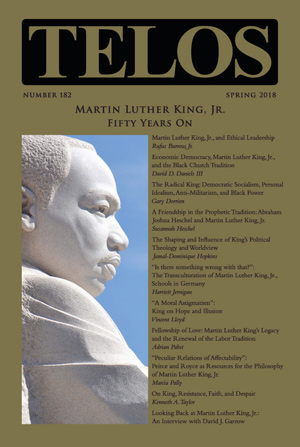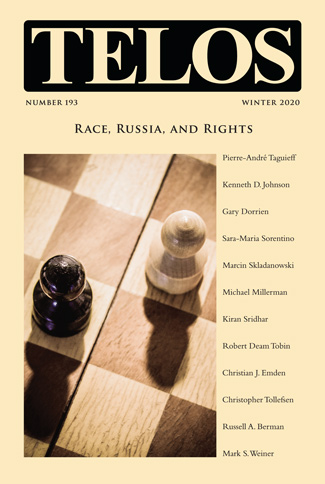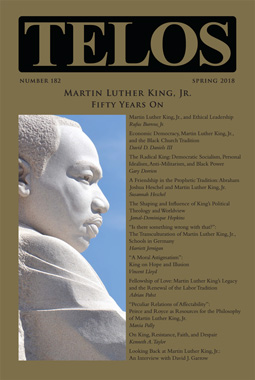By Telos Press · Monday, January 18, 2021 Save 30% on Telos 182 (Spring 2018): Martin Luther King, Jr.: Fifty Years On, a special issue dedicated to King’s life and thought, in our store. Offer expires 1/24/21.
 In commemoration of the life and legacy of Martin Luther King, Jr., today’s episode of the Telos Press Podcast features a wide-ranging interview with Kenneth D. Johnson by Telos editor David Pan. Their discussion covers a variety of topics, including the influence of King on the Black Lives Matter movement, the different approaches to political activism and civil disobedience, the call to defund the police, the nature and effects of systemic racism, the role of education in expanding opportunities for the Black community, the role of government in addressing social and economic inequalities, and the question of how a universal basic income might help alleviate these problems. In commemoration of the life and legacy of Martin Luther King, Jr., today’s episode of the Telos Press Podcast features a wide-ranging interview with Kenneth D. Johnson by Telos editor David Pan. Their discussion covers a variety of topics, including the influence of King on the Black Lives Matter movement, the different approaches to political activism and civil disobedience, the call to defund the police, the nature and effects of systemic racism, the role of education in expanding opportunities for the Black community, the role of government in addressing social and economic inequalities, and the question of how a universal basic income might help alleviate these problems.
In addition to being a member of Telos‘s editorial board, Ken Johnson edited Telos 182 (Spring 2018): Martin Luther King, Jr.: Fifty Years On, a special issue dedicated to King’s life and thought. We are now offering a 30% discount on Telos 182 when you purchase your copy in our store. With ten in-depth articles on King’s intellectual and political legacy, as well as an interview with King scholar David Garrow, Telos 182 is a must-read for anyone interested in understanding how Martin Luther King Jr. continues to influence us today. Read the introduction to Telos 182 here.
Listen to the podcast here.
Continue reading →
By David Pan · Friday, December 18, 2020 Telos 193 (Winter 2020): Race, Russia, and Rights is now available for purchase in our store. Individual subscriptions to Telos are also available in both print and online formats.
 What is not up for discussion? The answer to this question defines a political order, and the repressiveness of such an order will depend on where this boundary is set between the discussable and the undiscussable. But it is not as if more discussion necessarily means less repression. Certain topics—genocide, torture, slavery—definitely need to be off the table as legitimate political measures. Other topics—the choosing of rulers and historical facts—need to be discussable in order to avoid tyranny. In between lies a gray area whose definition will establish the character of each political order. Conversely, a lack of consensus on this issue will lead to political instability that goes beyond the content of political debates, indicating that the question of discussability coincides with the problem of political identity. This issue of Telos will consider three areas in which discussability has become the main issue, leading to implacable conflict. What is not up for discussion? The answer to this question defines a political order, and the repressiveness of such an order will depend on where this boundary is set between the discussable and the undiscussable. But it is not as if more discussion necessarily means less repression. Certain topics—genocide, torture, slavery—definitely need to be off the table as legitimate political measures. Other topics—the choosing of rulers and historical facts—need to be discussable in order to avoid tyranny. In between lies a gray area whose definition will establish the character of each political order. Conversely, a lack of consensus on this issue will lead to political instability that goes beyond the content of political debates, indicating that the question of discussability coincides with the problem of political identity. This issue of Telos will consider three areas in which discussability has become the main issue, leading to implacable conflict.
Continue reading →
By Kenneth A. Taylor · Monday, May 14, 2018 Kenneth A. Taylor’s “On King, Resistance, Faith, and Despair” appears in Telos 182 (Spring 2018), a special issue commemorating the life and thought of Martin Luther King, Jr. Read the full article at the Telos Online website, or purchase a print copy of the issue in our online store. Individual subscriptions to Telos are now available in both print and online formats.
Martin Luther King, Jr.’s deep and abiding religious faith led him to believe that “the arc of the moral universe is long, but . . . bends toward justice.” Though he believed that God exercises providential guidance over the universe, he did not think that the work of bending the arc of the universe belongs to God alone, with no need for human agency. We humans are urgently called by God to cooperate in the struggle for justice through “vigorous and positive action.” And King knew firsthand how arduous this struggle could be. We toil for justice in a darkened world that creaks and groans under the weight of many and diverse forms of injustice. Heeding the call may cost us much that is dear—including, as it did for King himself, our lives. King was convinced, however, that if our efforts are anchored in faith, we can rest assured that if we do heed the call, we will struggle neither alone nor in vain. The God who calls to us will struggle with us. “Evil dies on the seashore,” says King, “not merely because of man’s endless struggle against it, but because of God’s power to defeat it.” His faith that this is so not only spurred him to action but sustained him in his darkest hours and functioned as a bulwark against a potentially paralyzing despair.
Continue reading →
By David D. Daniels III · Monday, May 7, 2018 David D. Daniels III’s “Economic Democracy, Martin Luther King, Jr., and the Black Church Tradition” appears in Telos 182 (Spring 2018), a special issue commemorating the life and thought of Martin Luther King, Jr. Read the full article at the Telos Online website, or purchase a print copy of the issue in our online store. Individual subscriptions to Telos are now available in both print and online formats.
Is the concept of a “moral arc” to the economy that bends toward justice implicit in the thought of Martin Luther King, Jr.? Can a source for this concept be found in the economic justice campaigns of the Black Church? A moral arc to the economy that bends toward justice informs King’s concept of economic democracy, which frames his campaigns for economic justice. Throughout King’s writings from 1957 to 1968, he explores the economic plight of African Americans and advocates for economic remedies to the subordination of African Americans within most sectors of the American economy and the exclusion of African Americans from other sectors. He understands that parity between capital and labor is pivotal to achieving economic justice.
Continue reading →
By Rufus Burrow, Jr. · Monday, April 23, 2018 Rufus Burrow, Jr.’s “Martin Luther King, Jr., and Ethical Leadership” appears in Telos 182 (Spring 2018), a special issue commemorating the life and thought of Martin Luther King, Jr. Read the full article at the Telos Online website, or purchase a print copy of the issue in our online store. Individual subscriptions to Telos are now available in both print and online formats.
James MacGregor Burns, a pioneer in leadership theory, was certain that many people lack clarity about the meaning and place of leadership. “The confusion,” he said, “will continue as long as we fail to distinguish leadership from brute power, leadership from propaganda, leadership from manipulation, leadership from pandering, leadership from coercion.” What we have seen during and after the 2016 presidential election cycle in the United States is evidence of this ambiguity and confusion. In addition, political operatives and other presumed leaders fail to exhibit integrity, character, civility, courage, and a sense of obligation to the highest and best values. Instead, what we see persistently, particularly in the Donald J. Trump presidency, are efforts to cater to the worst in citizens, especially uneducated, unemployed, and underemployed white working-class people. For a long time I have wondered whether a study of Martin Luther King, Jr., (1929–1968) might reveal important lessons about the nature and meaning of leadership, leadership that reasonable people eagerly follow. This essay seeks to clarify how King understood leadership.
Continue reading →
By Harriett Jernigan · Wednesday, April 4, 2018 Harriett Jernigan’s “‘Is there something wrong with that?’: The Transculturation of Martin Luther King, Jr., Schools in Germany” appears in Telos 182 (Spring 2018), a special issue commemorating the life and thought of Martin Luther King, Jr. Read the full article at the Telos Online website, or purchase a print copy of the issue in our online store. Individual subscriptions to Telos are now available in both print and online formats.
 While it is common knowledge that a number of elementary, middle, and high schools in the United States are named after Martin Luther King, Jr., few people know that the Federal Republic of Germany is also home to a significant number of schools named in honor of him as well. The differences between American and German school systems, in particular the manner in which children are placed in special-needs schools in Germany, prompt a transculturation of the symbolic value of Martin Luther King, Jr., as the schools’ mission statements reflect. Although both American and German MLK schools are generally conspicuously diverse and underscore the importance of equality and diversity, their priorities diverge thereafter, with American MLK schools emphasizing academic preparation for upward mobility and global citizenship, and German MLK schools nonviolence and local integration, a divergence that arises partially from the priority German Leitkultur places on German-language proficiency. While it is common knowledge that a number of elementary, middle, and high schools in the United States are named after Martin Luther King, Jr., few people know that the Federal Republic of Germany is also home to a significant number of schools named in honor of him as well. The differences between American and German school systems, in particular the manner in which children are placed in special-needs schools in Germany, prompt a transculturation of the symbolic value of Martin Luther King, Jr., as the schools’ mission statements reflect. Although both American and German MLK schools are generally conspicuously diverse and underscore the importance of equality and diversity, their priorities diverge thereafter, with American MLK schools emphasizing academic preparation for upward mobility and global citizenship, and German MLK schools nonviolence and local integration, a divergence that arises partially from the priority German Leitkultur places on German-language proficiency.
Continue reading →
|
|
 In commemoration of the life and legacy of Martin Luther King, Jr., today’s episode of the Telos Press Podcast features a wide-ranging interview with Kenneth D. Johnson by Telos editor David Pan. Their discussion covers a variety of topics, including the influence of King on the Black Lives Matter movement, the different approaches to political activism and civil disobedience, the call to defund the police, the nature and effects of systemic racism, the role of education in expanding opportunities for the Black community, the role of government in addressing social and economic inequalities, and the question of how a universal basic income might help alleviate these problems.
In commemoration of the life and legacy of Martin Luther King, Jr., today’s episode of the Telos Press Podcast features a wide-ranging interview with Kenneth D. Johnson by Telos editor David Pan. Their discussion covers a variety of topics, including the influence of King on the Black Lives Matter movement, the different approaches to political activism and civil disobedience, the call to defund the police, the nature and effects of systemic racism, the role of education in expanding opportunities for the Black community, the role of government in addressing social and economic inequalities, and the question of how a universal basic income might help alleviate these problems. 








